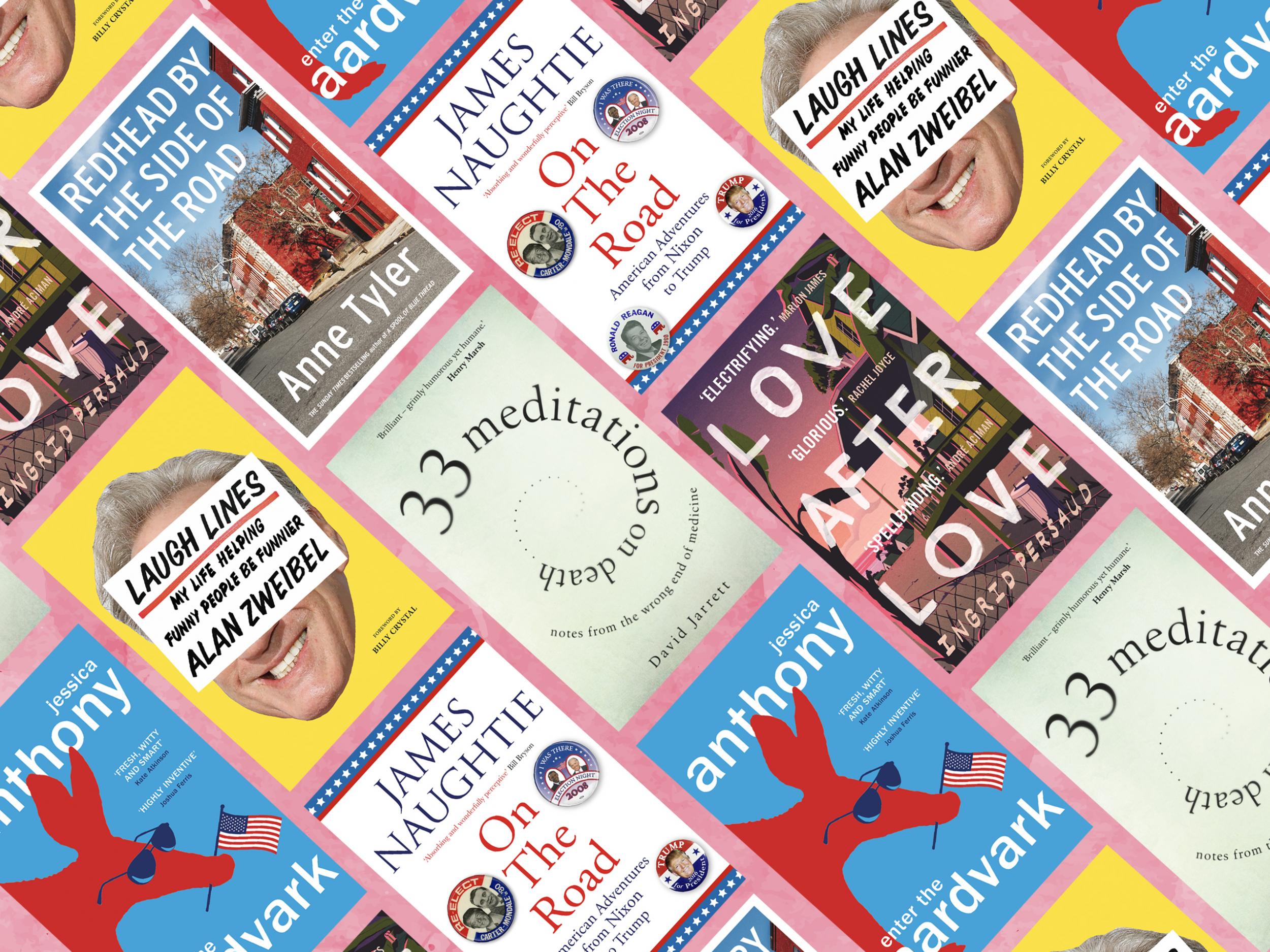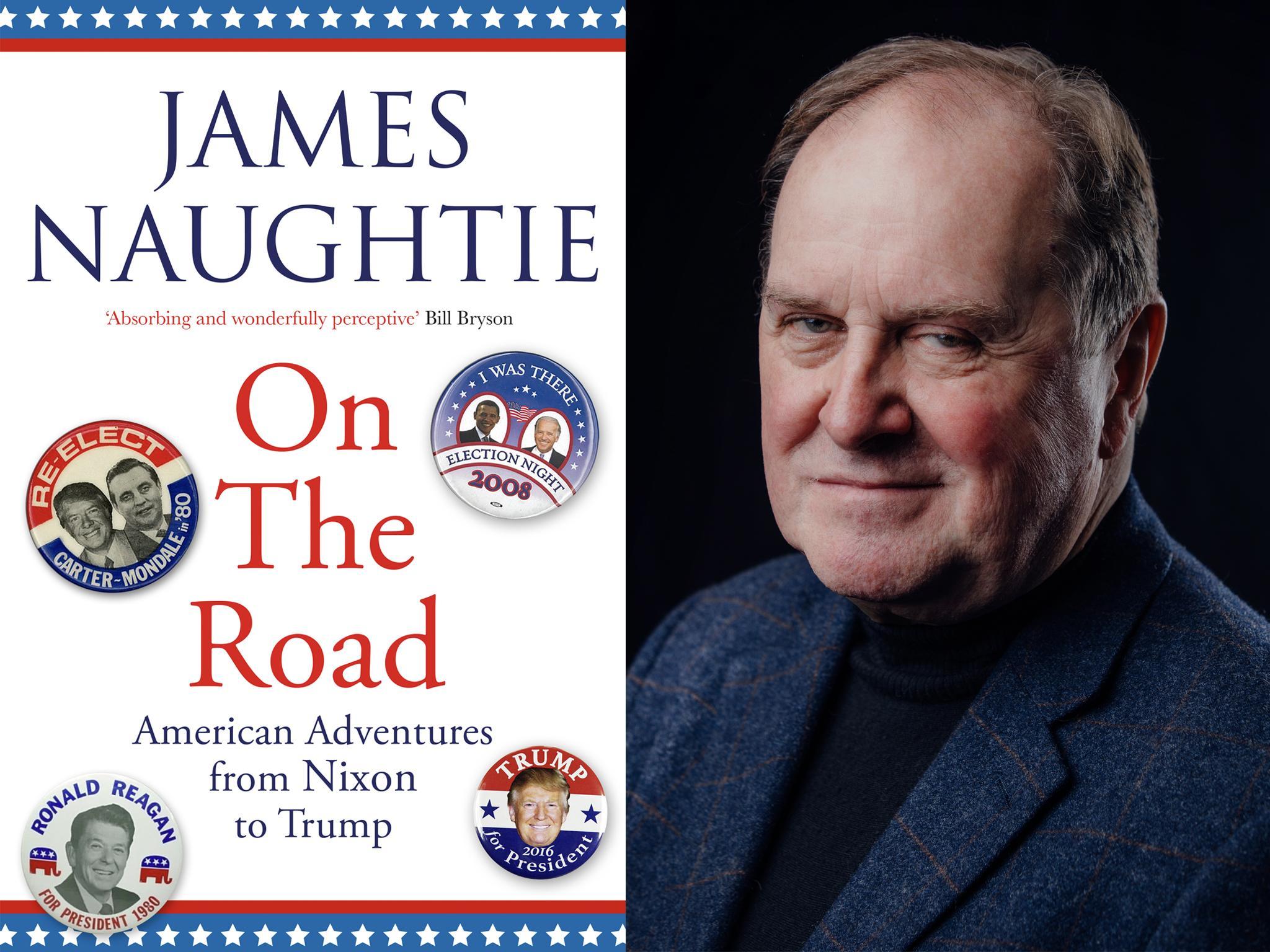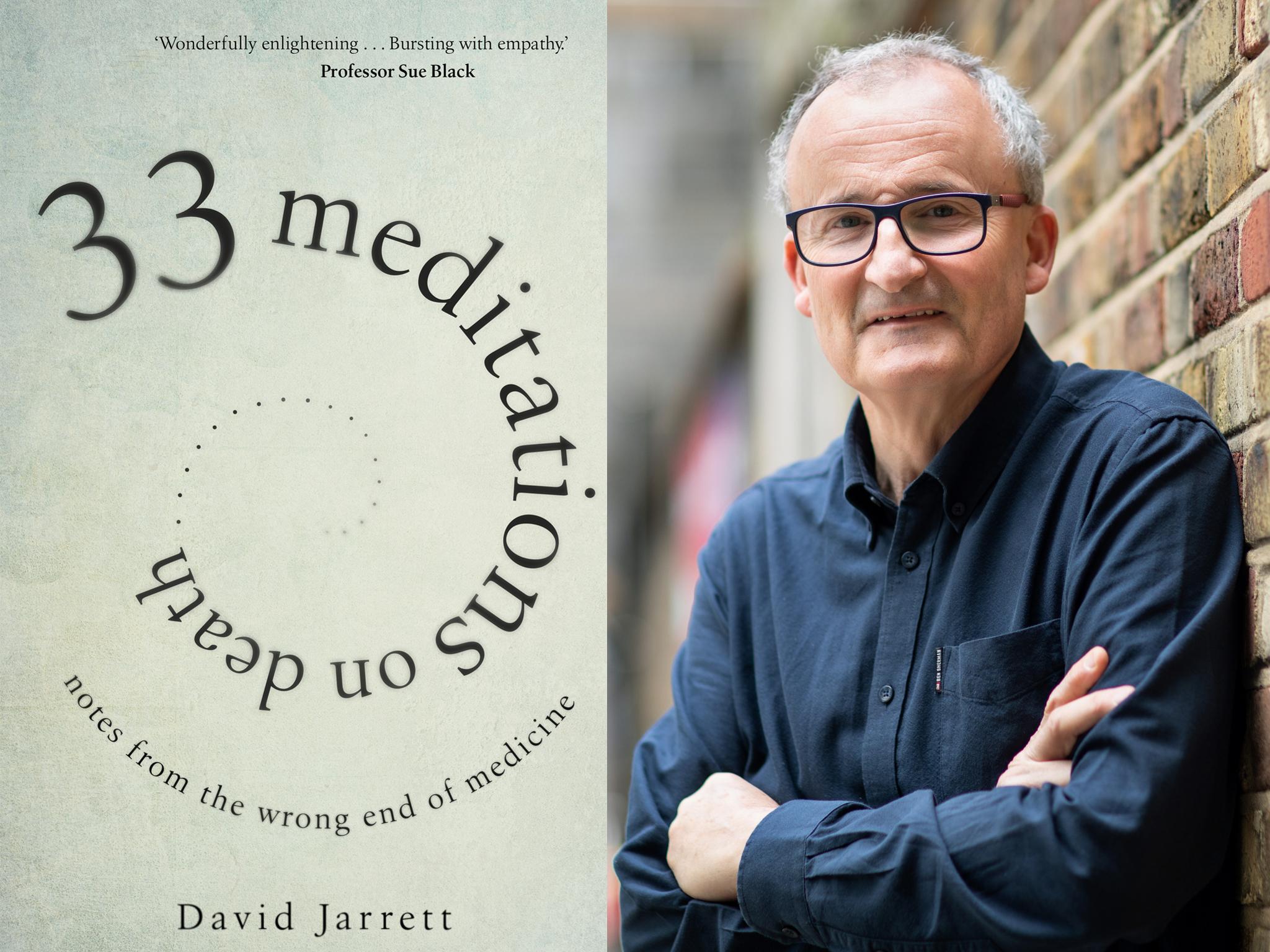Books of the month: From James Naughtie’s On the Road – American Adventures from Nixon to Trump to Ingrid Persaud’s Love After Love
Martin Chilton reviews six of April’s releases for our monthly book column


Since bog roll panic-buying has become a social craze, it seems pertinent to start April’s column with Dr Tara Shine’s tip from How to Save the Planet One Object at a Time (Simon & Schuster). “Try bamboo toilet paper. It grows more quickly than trees and is sustainable,” she writes.
In Together: Loneliness, Health and What Happens When We Find Connection (Profile Books), Vivek H Murthy, a former surgeon general, argues for building a people-centred world. You can probably guess that he worked for Obama, not Trump.
Comedian Samantha Irby calls herself “a high-functioning depressed and anxious person”. In Wow, No Thank You. (Faber), she writes entertainingly about her mishaps, as does Kaiya Stone in Everything Is Going to Be KO (Head of Zeus).
Among the best debuts are The Silent Treatment by Abbie Greaves (Century), Naoise Dolan’s Exciting Times (Weidenfeld & Nicolson) and Paul Mendez’s gritty Rainbow Milk (Dialogue). In Cleanness (Picador), Garth Greenwell continues the unsettling story of an American teacher in Sofia. Peace Talks by Tim Finch (Bloomsbury) is a shrewd delight. How to Pronounce Knife (Bloomsbury), by Lao-born poet Souvankham Thammavongsa, includes the offbeat tale of a middle-aged immigrant obsessed with singer Randy Travis.
Strong thrillers include Buried (Zaffre), a new series from Lynda La Plante, and Stephanie Scott’s What’s Left of Me is Yours (Orion), set in the Tokyo underworld.
Kaouther Adimi’s A Bookshop in Algiers (Serpent’s Tail) is a timely reminder of the importance of independent bookshops. Please support your local store in these difficult times.
Memoirs from James Naughtie, comedy writer Alan Zweibel and NHS doctor David Jarrett, along with fiction from Anne Tyler, Jessica Anthony and Ingrid Persaud, are reviewed below in full.

‘Love After Love’ by Ingrid Persaud ★★★★☆
Until as recently as April 2018, it was a crime in Trinidad for adults of the same gender to have sex – and terrifying homophobia is a backdrop to Ingrid Persaud’s highly impressive debut novel Love After Love.
The story centres on a quirky makeshift family, which is comprised of widow Betty Ramdin, her shy son Solo and the lodger Mr Chetan. Betty bears the scars of the toxic masculinity she experienced from her late husband. Teacher Mr Chetan lives in permanent fear of being outed as gay, in a country where “buller man” is a common term of abuse. He remarks quietly on a culture where “even from the pulpit” gay people are described as “filthy”. When secrets spill out one fateful night, Solo flees to America.
Although there are depressing themes running through the novel, Love After Love is also a joyous account of life as a Trini, full of sparkling dialogue and earthy language. A rotten relationship is described as “a carcass” that is dragged from one hurricane season to the next. Lots of minor characters are “dotish” (a dumbass), which is a common insult in Trinidad.
The novel is erotic and full of mouth-watering descriptions of food. Sometimes the lines between sex and food blur, as when Betty’s body is compared to a ripe Julie mango. In one small scene, Persaud brilliantly captures the fun of being at a cricket match in Trinidad, down to the man selling nuts, expertly chucking his bags into the crowd.
The twists in the story put the three main characters in testing, lonely situations – and everything comes to a head after an appallingly violent crime. Despite the anguish, Love After Love is also a book about loyalty, resilience and the best of human behaviour. As Betty says: “It’s only when you’re at the bottom of the well and calling for help that you find out who will throw a rope.
Love After Love by Ingrid Persaud is published by Faber, £14.99

‘On the Road: American Adventures from Nixon to Trump’ by James Naughtie ★★★★☆
Broadcaster James Naughtie calls on Jack Kerouac’s 1957 novel On the Road for the title of his book about his experiences in America, but this is no tell-all reminiscence. Although Naughtie decides to share the tidbit that “Gore Vidal once told me in unfortunate detail the tale of his own sexual experience with Kerouac”, he says he has “no interest in recalling” the sweaty incidentals.
Naughtie instead focusses on weightier matters, giving an insightful account of living through momentous times and meeting Very Important People. He recalls “the deep public discomfort” when the Watergate tapes revealed the extent of president Nixon’s foul mouth. I wonder would a Tricky Dicky-style comment such as “I don’t give a shit about the lira” even pass for shocking with the current White House?
Two of the most telling anecdotes in the book, however, are about British prime ministers during their trips across the Pond. Margaret Thatcher was having another of her large glasses of Scotch when she gave away her true feelings about Ronald Reagan. A diplomat friend of Naughtie was in the room when foreign secretary Lord Carrington asked about her meeting with the president. “Tapping the side of her head, she said of Reagan, ‘Peter, there’s nothing there,’” Naughtie recalls. Tony Blair does not come out well in the account of his visit to Bill Clinton’s White House. The gushing Prime Minister “couldn’t conceal his excitement at being placed on a table with Barbra Streisand”.
There is a lot about Donald Trump in On the Road, and none of it good. The man who inspired the character of the bully character Biff in the Back to the Future films played golf on 223/997 of his first days in office (Naughtie cites official White House records), but the author warns that we may yet long for a time when all the president did was swing a club. Naughtie quotes an (unnamed) senior election analyst who warns that, “if Trump thought in late 2020 that he was going to lose the election, he might do anything. Anything”.
Students of modern American history will find much to enjoy in Naughtie’s astute memoir.
‘On the Road: American Adventures from Nixon to Trump’ by James Naughtie is published by Simon & Schuster, £20

‘Redhead by the Side of the Road’ by Anne Tyler ★★★★★
At 78, Pulitzer-winner Anne Tyler is still writing with her customary class and subtle wisdom. Redhead by the Side of the Road is another marvellous addition to a back catalogue that includes Breathing Lessons and The Accidental Tourist.
Although the central characters in her new novel are understated – an underachieving computer technician called Micah Mortimer and his occasional lover Cass – they are a deceptively simple vehicle for a shrewd exploration of the way we blunder through life. Micah is irritating, yet oddly likeable – and you might even agree with his plea for the world to “start running at a manageable speed again”. Micah puts up with teasing about his pernickety nature from his brother-in-law (“is it vacuuming day? Is it dusting day? Is it scrub-the-baseboards-with-a-Q-tip day?”), and is baffled by the elusiveness of love and the difficulty of connectivity.
Tyler doesn’t spare her older characters – “sunken” people with “toothpick legs” – but her underlying message is always kind. In one key scene, teacher Cass is explaining to her young class why they are wrong to be repulsed by the “clutchy” hands of the old ladies they visit in a nursing home. Cass tells the children they need to be kind to “a roomful of broken hearts”.
The world outside an OAP home is also full of broken hearts, of course, and Micah’s past breaks into his life in an unexpected way, causing all sorts of turbulence. He is finally forced to confront the truth: that his “entire life is in a rut”.
Redhead by the Side of the Road proves again that Anne Tyler is one of modern literature’s true treasures – and the ending is enough to raise anyone’s spirits
‘Redhead by the Side of the Road’ by Anne Tyler is published by Chatto & Windus on 9 April, £14.99

‘Laugh Lines: My Life Helping Funny People Be Funnier’ by Alan Zweibel ★★★★☆
Alan Zweibel’s contacts book is a who’s who of modern American comedy and entertainment – and among the people who appear in his enjoyable memoir Laugh Lines are Tom Hanks, Mel Brooks, Steve Martin, Martin Short, Rob Reiner, Larry David, Richard Lewis and Billy Crystal. There is even a revealing story about Eric Clapton, who scored Emmy-winning writer Zweibel’s movie The Story of Us.
The 69-year-old Zweibel took a break from working with Crystal on a new film called Here Today to write his memoir. The book opens with tales of his formative years writing for Saturday Night Live – and the thrill of working with born improvisers such as John Belushi and Dan Aykroyd. He recounts how, playing the fool, Chevy Chase interrupted a conversation between Robert Altman, Gore Vidal and Norman Mailer, prompting the acclaimed director of Nashville to glare at Chase and turn away.
Zweibel was capable of his own mischief. After leaving a meal at New York’s Russian Tea Room, he decided to mock a legend of American music. “I mustered the gumption to say to the vertically challenged Paul Simon, ‘You don’t know it yet, but it’s raining.’ And thank God he laughed,” recalled Zweibel.
Larry David was a colleague when Zweibel tried his hand at the stand-up comedy circuit. Zweibel was watching from the sides when David used to amuse himself with obscure riffs about Roman verbs. “The audience would sit there stunned, he’d leave the stage with a wave of his hand conveying they weren’t worth his time,” said Zweibel.
The section about comedian Garry Shandling, which includes some of his witty ad-libbed jokes, is intriguing. Zweibel took part in regular basketball matches at Shandling’s home, playing alongside an A-list of stars such as Ben Stiller, Adam Sandler, Bob Odenkirk, Sacha Baron Cohen and Sarah Silverman (who was better than the men). “I don’t remember dislocating Judd Apatow’s shoulder,” says Zweibel. “To this day, my right arm goes a little lower than my left,” Judd tells him. “Every time I put on a shirt, I think about you.”
Zweibel is also candid about his own failings, from the time he was consuming cocaine to his writing mishaps. The tale of the disastrous CBS show Good Sports, written for Ryan O’Neal and Farrah Fawcett, is wince-inducing. The pair fought constantly and the late Fawcett used to pick up her shirt and flash Zweibel to make O’Neal jealous. The star of Charlie’s Angels also bought a Tiffany ankle bracelet and charged it to the production team at Good Sports. When the nightmare programme was cancelled, Zweibel’s agent Bernie rang to warn him that, in the eyes of television executives, the comedy writer was now “colder than whale shit”.
The account of the failure of his movie North, which starred Bruce Willis, Julia Louis-Dreyfus and eight-year-old Scarlet Johansson in her first movie, is memorably funny. Zweibel says he knew something was wrong when he found his parents weeping in the limo after the premiere. Roger Ebert’s review of North was succinct. “I hated this movie. Hated, hated, hated, hated this movie. Hated it. Hated every simpering stupid vacant audience-insulting minute of it,” he wrote. Zweibel finally ran into the film critic 12 years later – but I won’t spoil the hilarious pay-off to that story.
My favourite tale is about the time Zweibel’s friend Mary visits the 84-year-old author Phillip Roth in hospital, just after Bob Dylan was awarded the 2016 Nobel Prize for Literature. Mary was not sure whether to break the news of the singer’s triumph. Roth suddenly tells her he has good and bad news, and will start with the latter. “I didn’t win the Nobel Prize,” he says. The good news? “I’m going to be inducted into the Rock and Roll Hall of Fame,” Roth says deadpan.
You can’t beat humour as a response to life – and Zweibel’s book overflows with it.
‘Laugh Lines: My Life Helping Funny People Be Funnier’ by Alan Zweibel is published by Abrams Press on 14 April, £19.99

‘33 Meditations on Death: Notes from the Wrong End of Medicine’ by David Jarrett ★★★★☆
I’m not sure whether reading a brutally frank book about growing old and dying during this coronavirus crisis is a good or bad thing, but David Jarrett’s book is a remarkably likeable guide to a grisly subject. There are moments of real humour and positivity from Jarrett – who worked for 30 years as an NHS consultant in geriatric and stroke medicine – but there is no concealing that 33 Meditations on Death is an unsparing meditation on annihilation from a man who admits that “in my view, optimism is humankind’s greatest delusion”.
“Pull up the loose skin on the back of your hand and let go,” writes Jarrett. “If you are young the skin is elastic and springs back instantly. If you are old, it stubbornly stays where it is. This is happening to all your tissues, not just the visible organs,” he writes. Try reading that sentence last thing at night if you know your own body’s best days are behind you.
Jarrett, who lived in Canada, the USSR and Africa and the UK, has lived a remarkable life, witnessing things most of us would rather avoid. When he was working in southern India at a small mission hospital in Chikkaballapur, for example, an old man who had been disembowelled by the horns of a cow walked in holding his intestines in a towel. Jarrett was part of the team that saved the man’s life. So, what did you do at work today, dear?
The author looks at “good deaths”, and horribly bad deaths, and is candid about the sadly inevitable mistakes that are sometimes made by medics under pressure. “With each failed resuscitation, a little bit of you dies. Yet something also grows. Experience, inevitably, but perhaps also wisdom. The understanding that life, unfair and fickle, is also precious and must never be taken for granted,” states Jarrett. His praise for the overwhelming kindness of NHS staff seems particularly apt.
The book is full of thoughtful musings about the serious problems facing modern healthcare, including the decline of trust, once the cornerstone of the doctor-patient relationship. He also believes society is in “collective denial” about the effects of ageing. He is droll about the world of geriatric medicine – as people enter what he calls “life in the twilight zone”. That reference, incidentally, comes from musician Dr John. Jarrett opens each of the 33 meditations with a quote from literature or music, including from David Bowie and Amy Winehouse.
Jarrett recounts his own experiences with ailing parents in the twilight zone. Anyone who has visited relatives in care homes will shudder at his grimly accurate account of the reality of old folk trapped listening to Max Bygraves’s Singalongamax Volume 4 on the care home PA system. “After two years visiting my mother, I knew all the words to The Seekers’ greatest hits,” Jarrett jokes.
Perhaps the recently removed Kenny Rogers was right all along: the best you can hope for is to die in your sleep. Anton Chekov seemed to have a reasonably “good death”. The Russian author drained a glass of sparkling wine, commenting “it’s a long time since I drank champagne,” before lying down to die. Context is everything, though. Chekov was only 44 at the time.
I suspect each reader will have a personal response to 33 Meditations on Death. I found it to be daunting, yet ultimately life-affirming. Jarrett also provides a brilliant tip: type ‘Ghanaian coffins’ into Google images. Go ahead, the photographs are truly splendid
‘33 Meditations on Death: Notes from the Wrong End of Medicine’ by David Jarrett is published by Doubleday on 16 April, £14.99

‘Enter the Aardvark’ by Jessica Anthony ★★★★☆
When we meet Republican congressman Alexander Paine Wilson, the protagonist of Jessica Anthony’s Enter the Aardvark, he is in the middle of a tricky re-election campaign in his Virginia district. He does not want to lose to a female opponent, especially not a woman named Nancy Beavers.
Wilson is rich and handsome – and preposterous and shallow. He is a Ronald Reagan groupie. He buys the same cowboy shirts the President used to wear, and even purchases a canary-yellow velvet sofa on which the former film star used to recline. Wilson’s advisors are conscious that this effete image may not play well with the voters. The Republican congressman is told he needs to “Find A Wife” to help his political career.
The secrets about his private life are blown wide open when FedEx delivers an ancient stuffed aardvark, setting in chain a series of bizarre incidents. The story of how his career descends into scandal and farce is told with terrific wit, as Anthony comically disembowels the politician and then stuffs him again for good measure.
The inventive parallel plot is about the Englishman who reconstructed the strange African animal more around 170 years before it reaches Wilson. That taxidermist, Titus Hamilton, is also a man of secrets. The potent tale of his hidden love, and how his life comes apart at the seams in Victorian England, foreshadows the public and private hypocrisy that will bring down a public figure in the “oily machine” of modern politics.
To tell any more of the plot would spoil this twisty, meditative book – which is part satire, part ghostly mystery – and which has pertinent things to say about homophobia. Also, if you are anything like me, you will end up loving the actual aardvark (it’s not his fault he’s a Nazi), and relish the world of taxidermy that Anthony brings to life.
Enter the Aardvark sizzles with uproarious fun, from its snout to the sting in its tale.
‘Enter the Aardvark’ by Jessica Antony is published by Doubleday on 23 April, £12.99
Join our commenting forum
Join thought-provoking conversations, follow other Independent readers and see their replies
Comments